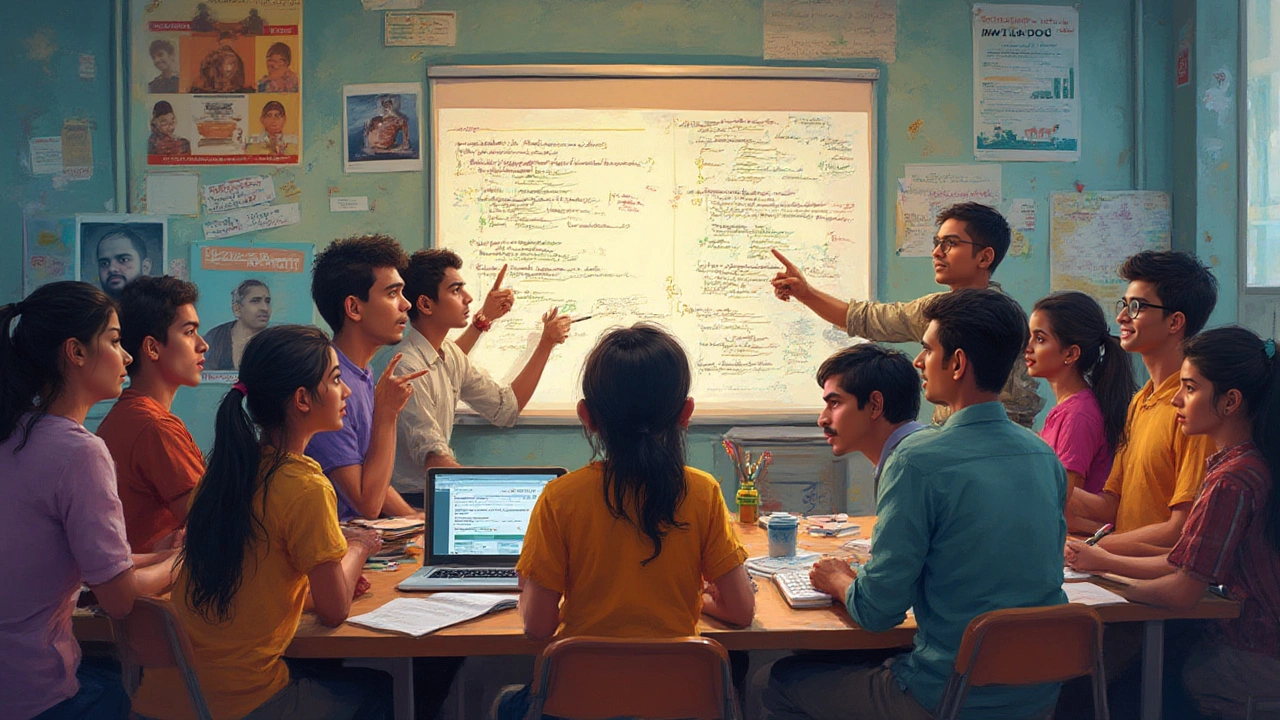Imagine spending hours staring at your screen, thinking you’ve written everything perfectly, but your code just throws an error that makes zero sense. You Google the message. Some results look like ancient runes. Welcome to the wild world of coding—the modern-day marathon for the mind, where every finish line reveals a new, longer track. The hardest thing about coding? It’s not learning your first programming language, or memorizing syntax. It’s the non-stop cycle of solving problems that sometimes feel impossible, and bouncing back after each brain-melting bug tries to kill your spirit.
Why Coding Feels So Darn Hard—And What’s Actually Going On
People love to say coding is just “logic and patience,” but that barely skims the surface. Here’s the thing: coding is really about figuring out what’s not working, over and over, until something clicks. It’s a mix of logic, wild guessing, creativity, and a good dose of stubbornness. The tricky part? Most of what you learn isn’t about language or commands, but about how to think through messes, ruthlessly simplify problems, and stay calm as deadlines or that blinking cursor threaten your sanity.
Cognitive overload is a real problem. Even a short chunk of code can hide dozens of tiny moving parts, each ready to break if you breathe wrong. In one study, researchers at MIT found that new coders spend up to 60% of their time just hunting for errors—sometimes ones as small as a missing semicolon. You can know what you want your program to do perfectly in your head, but expressing it in cold, unforgiving code is a different beast entirely. Not to mention, you often have to combine rules from math, logic, and user behavior, and make sense of it all when your cat, Felix, decides to sit on your keyboard.
But why does it feel so chaotic? Humans are wired for talking, visuals, hands-on stuff—the world of natural things. Code is mechanical, abstract, precise. You can fudge a sentence in conversation and everyone gets what you mean, but code throws a tantrum over a single misplaced character. Debugging isn’t just a technical exercise, it’s a psychological wrestling match with your own brain’s tendency to gloss over mistakes you’ve stared at too long.
The solitary struggle adds another layer of stress, especially for people new to the field. While there are communities and forums, when you're deep in a bug, it can feel like you’re marooned on an island. That’s why so many folks stall at the “intermediate” level—jumping from simple projects to building complex software feels like scaling a wall with nothing but a toothpick.
Common Obstacles Every Coder Runs Into (And How They Sneak Up on You)
There’s a reason why so many beginner programmers hit a wall and quietly abandon their coding dreams. Let’s break down the common enemies:
- Impostor syndrome—the feeling that everyone else “gets it” and you’re just faking it until you get caught. It doesn't vanish with experience either—the top Google engineers have written about feeling this way even years into their careers.
- Information overload—as new tools, frameworks, and updates never stop rolling out. A web developer in 2025 needs to keep up with changes at a breakneck pace. In fact, Stack Overflow’s 2024 survey found that 68% of professional developers feel they can’t keep up with emerging tech.
- Chasing “perfect” solutions—spending hours perfecting every detail, instead of building something simple that works. Perfectionism freezes progress and breeds burnout.
- Ambiguous requirements—ever been told, “Make it just like this, but better,” with no details? Translating fuzzy wishes into real code taxes even the wisest among us.
- Burnout—staring at code too long and hitting that mental wall where nothing makes sense anymore. It’s very real; NCBI published data in late 2023 showing software engineers reporting burnout symptoms at twice the average rate for other tech workers.
- Communication—coding is often seen as solo work, but most big projects require teamwork, code reviews, explaining your logic, and mediating with non-coders. The bigger your team, the trickier it gets.
- Legacy code madness—it’s not all shiny new startups. In the real world, you’ll spend a ton of energy working with old, messy code bases that scream for mercy every time you touch them.
| Challenge | Common Impact | Possible Solution |
|---|---|---|
| Debugging | Time loss, frustration | Rubber ducky debugging, pair programming |
| Keeping up with tech | Stress, overwhelm | Dedicated weekly study blocks |
| Ambiguous goals | Vague products, rework | Regular check-ins with stakeholders |
| Impostor syndrome | Low confidence, quitting | Coding journals, peer feedback |
| Burnout | Reduced productivity | Work-life balance strategies |
Notice how technical and emotional challenges mingle together. You’re not just a coder; you’re a negotiator, a detective, an eternal student, and sometimes a bit of a therapist, at least for your own sanity.

Proven Strategies From Real Programmers Who Haven’t Quit Yet
So, how do people keep going? Spoiler: They don’t have superhuman brains or magic tricks—they just build up good habits and mental frameworks, and forgive themselves when they screw up (a lot). Here’s what works for most seasoned coders I know—and some I’ve picked up after enough stress-eating peanut butter from the jar:
- Break the problem into chunks. Don’t try to solve everything at once. Major bugs usually unravel if you zoom into one small part, fix it, and then move to the next. When my project breaks, I walk Felix to reset my brain, then focus only on one small file at a time.
- Search for existing solutions shamelessly. Stack Overflow exists for a reason; someone else has almost always had your problem and survived. Copy-pasting isn’t cheating if you actually understand what the code is doing.
- “Rubber duck” debugging—explain your code line by line to an inanimate object (mine’s an old coffee mug at this point). The process often reveals what you’ve overlooked.
- Pace yourself. Expect confusion and mistakes. Get comfortable sitting with a problem, sleeping on it, and coming back fresh. A tired brain can turn a 10-minute fix into a 3-hour fiasco.
- Celebrate tiny wins. That moment when your code finally prints “Hello, World” or a button changes color? Worth a fist pump. Don’t wait for the perfect project to count as “success.”
- Ask for help without shame. Good developers aren’t the ones who never get stuck—they just know when and who to ask for help. If you join a team, contribute to code reviews and offer your perspective—everyone’s brain spots different things.
- Stay skeptical of “fast track” courses that claim to make you job-ready in a month. Learning to code is more slow-cooked stew than microwave meal.
Coding gets easier, not because the problems are simpler, but because your tolerance for chaos and ambiguity grows. Statistically, programmers who stuck with coding past the first year are over 75% more likely to make a full career out of it compared to those who quit in the first three months. That grit is the real skill. Everything else can be Googled.
Why The Struggle in Coding Never Really Ends (And Why That’s Not a Bad Thing)
Here’s a plot twist: The hardest thing about coding never fully goes away. Every new language, library, or project brings fresh confusion. If you work as a coder, you’ll be bad at something new at least once a week. Even senior devs will say, “I’ve never seen this before,” more times than they admit. The difference is, they aren’t bothered by it anymore. Instead, they see constant struggle as job security and built-in variety.
Good code today can become a migraine tomorrow. Platforms change, dependencies break, users push buttons you never thought existed. I once had a bug caused by a single emoji in a username. Felix, my cat, could probably have solved it faster by napping on my keyboard. No amount of fancy IDEs or AI coding assistants will ever completely shield you from those “why doesn’t this work?” moments.
If you stick with it, you start seeing patterns and strategies that kick in whenever you hit a wall. Things like writing more tests, documenting your own code as if you’ll forget it all, and building a library of “cheat sheets” for quick reference. Eventually, what was once impossible turns into “just annoying,” and the stuff that used to annoy you becomes second nature.
So, if you’re wrestling with code and feeling lost—welcome to the club. You’re exactly where every good programmer has been. It’s hard because it’s supposed to be hard. Keep at it, stay curious, and remember: even the best coders on Earth started out just as confused as you. And possibly with a cat on their lap.
